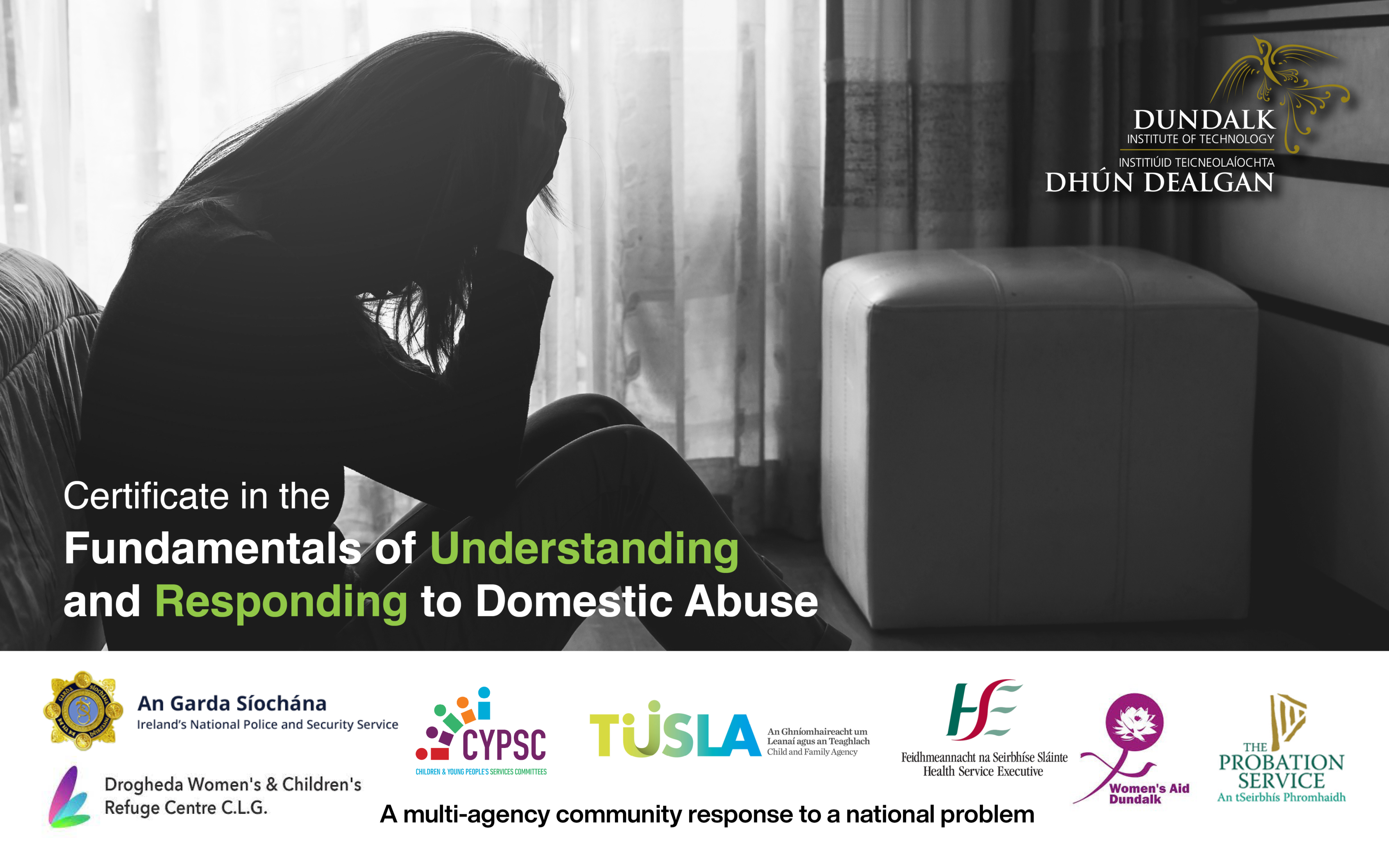
Find information on how to make a Protected Disclosure under the external procedures in place in the HEA.
The changing landscape of Domestic Abuse – The impact of a multi-agency educational initiative

Who we are
Dundalk Institute of Technology (DkIT) is the leading higher education provider in the North Leinster-South Ulster region, attracting learners nationally and internationally. Central to our strategy is the community served by the Institute – its internal community of learners and staff and external community stakeholders, including employers, enterprise, community organisations and others. DkIT’s mission is to address the needs of all learners and learner groups in a responsive and flexible manner and to meet the needs of its external stakeholders.
What we did
We co-created and delivered Ireland’s first accredited programme aimed at frontline staff in how to recognise and respond to domestic abuse. Through the work of Louth Children’s and Young Persons Services Committee, it emerged that although the area of domestic abuse was covered in third level undergraduate programmes, there was a lack of accredited training programmes for those working in the sector. This prompted us to carry out a survey of frontline professionals in 2015 which identified that 140 respondents from a range of domestic abuse support services had no accredited qualification in domestic and had an expressed interest in undertaking a programme of training in this field.
In response, we developed the 13-week Level 8 programme ‘Certificate in the Fundamentals of Understanding and Responding to Domestic Abuse’ (FURDA) as an inter-agency collaboration with key individuals from a range of stakeholder groups. These groups include Women’s Aid Dundalk, Drogheda Women’s and Children’s Refuge Centre, the Probation Service, the Departments of Social Work and Midwifery at Our Lady of Lourdes Hospital, Drogheda and An Garda Síochána.
Impact achieved
Launched in 2016, the FURDA programme has been completed by almost 150 students from a diverse range of frontline services in almost all counties in Ireland. The programme is delivered almost entirely online, requiring only one day of in-person attendance, meaning it has a national and, potentially, an international reach.
A descriptive quantitative evaluation study was undertaken between 2016 and 2018 to appraise FURDA students’ change in knowledge of, attitudes towards and skills in recognising and responding to domestic abuse. Thirty-six students completed pre-programme questionnaires and twenty-two students completed post-programme questionnaires. The findings of this modest evaluation study suggest that students’ attitude, skills and knowledge in relation to domestic abuse appear to have improved after completing the programme. In particular, students were better able to recognise the complexity of the issue of domestic abuse and they may have become less judgmental, possibly demonstrating a change in attitude about where the responsibility for abusive behaviour lies. Results of the evaluation also suggested that more survivors will be offered professional help as a result of students attending the course and, as a consequence, more people may be safer.
Qualitative evidence from graduate testimonials further affirmed the positive educational impact of the programme among students from diverse backgrounds:
“The mapping and trajectory of the impact of domestic abuse in our society from pre-birth to death resulted in each of us exploring how we can mitigate against it in our individual disciplines. The course is professional in its operation and engagement with students to ensure that everyone got the maximum learnings from the course. I will continue to recommend all practitioners and colleagues to complete this course”.
– Member of An Garda Síochána’s National Domestic Abuse Unit.
“This programme has really changed my perception of Domestic Abuse. It is only after completing the programme that I now understand that there are a multiplicity of complex reasons why a victim stays in an abusive relationship. The programme has provided me with many insights which I can now use in my role as a midwife to better support victims of Domestic Abuse”.
– Midwife, Health Service Executive.
“…My learning and understanding of brain development has influenced my thinking on the development of services for children in the context of domestic abuse and as within the remit of the Domestic, Sexual & Gender Based Violence Programme…”
– Domestic Violence Services, Tusla Child & Family Agency.
“I would say that taking part in the Domestic Abuse programme at DkIT enabled me to view our clients and the work that we do with them, from a much wider perspective. The theories and academic content introduced was hugely enlightening, with lots of “aha” moments. But I also learned so much from sharing the experiences and different viewpoints of my classmates”.
– Front line worker, Women’s Refuge
In Autumn 2019, we organised the conference ‘The Changing Landscape of Domestic Abuse – A Multiagency Perspective’ in collaboration with Tusla, Social Services, and the Department of Justice and Equality, bringing together more than 250 delegates from relevant front-line agencies.
What we learned
Key learning points have emerged from delivering the FURDA programme:
· There is a need to expand and extend the provision of education surrounding domestic, sexual and gender-based violence;
· Future funding should target broadening the availability and opportunities to engage with the programme in addition to parallel evaluation of their efficacy and worth;
· Providing the programme to cohorts that are most in need of further support and education in the areas of abuse and gender-based violence would be a key aspiration of the team;
· Ensuring that these evidence-informed learning opportunities are equitable, inclusive, manageable, and meaningful will be key drivers for future developments. The Third National Strategy on Domestic, Sexual & Gender-Based Violence 2022-26 outlines as one of its actions the need to ‘Enable frontline professionals and support staff to have the necessary analysis, skills, and expertise to identify potential Domestic, Sexual and Gender-Based Violence risks and make appropriate preventative interventions and referrals.’ The FURDA through its design, multidisciplinary approach and national reach has, and will continue to have, a major impact on this key action.